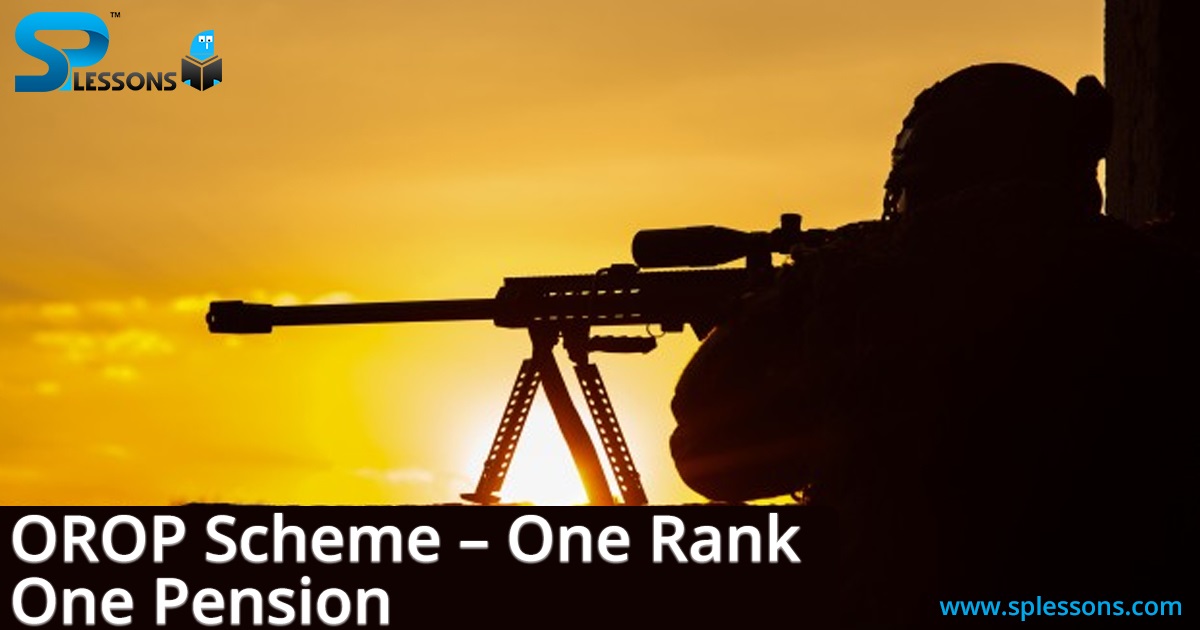 Topic
Topic
OROP Scheme - One Rank One Pension
 Essay
Essay
- One Rank One Pension is the award of the same pension to the same ranking military officers, regardless of the date of the retirement. The scheme has been put into effect nearly 40 years later. Depending on it, the Indian Armed Forces’ pension and benefits were to be decided till 1973.
- Indira Gandhi led congress in 1973 removed the OROP, the ground for determining the retirement of Indian Armed Forces officers which had been in current practice via an ex parte administrative policy for 26 years since independence. Moreover, the [latex]{3}^{rd}[/latex] pay commission has risen civil pensions and lowered the soldier's pensions.
- A pay commission is held every 10 years and offers suggestions to raise the salary and benefits of the service staff depending on several measures such as inflation, price increase, and rising living expenses to satisfy the basic needs that are directly proportional to the position of a defense officer, etc.
- On 19 December 2011, the Koshyari Committee reviewed and published its report on the matter of awarding OROP to Armed Forces Personnel.
- Any changes would be carried on to previous pensioners normally.
- It ensures narrowing the difference between the present and previous pensioners’ pension scales at regular intervals, stated by Defence Minister Manohar Parrikar while presenting the statement.
- After the policy is enforced, the war widows will acquire the sum of arrears in one step whereas the retired military officials will obtain it in four half-year installments over two years.
- Those who quit the military early for private better opportunities will not be eligible to OROP’s privileges but those who are forced to quit the army due to injury and those with significant obligatory leave will get OROP.
- Finally, after every 5 years, the payments will be updated and modified and carefully examined.
Did You Know? Koshiyari committee – a 10 member all-party parliamentary panel, formed under the chairmanship of Bhagat Singh Koshiyari
| Introduced by | Introduced in | Prime objective |
|---|---|---|
| The Modi Government introduced the OROP scheme | On [latex]{6}^{th}[/latex] October 2015 | to provide similar pension to military officers who retire with the same status after the same period, irrespective of their retirement date. |
-
1. The current government came into power on 26 May 2014 and it was then decided to bring the scheme into action as soon as possible.
2. From 1 July 2014, the scheme is in force with 2013 being the initial year. The military members expected OROP from 1 April 2014 and 2015 as the foundation year.
3. Nearly 3 million military members are included in the OROP scheme. Four semi-annual payments shall be provided for arrears and all widows, along with war widows, shall receive arrears in one step.
4. Pension for all retired pensioners with an estimated minimum and maximum pension in the same position and working period in 2013 will be revised. It will cover those who receive pensions above the average.
5. The approximate value is Rupees 8000-10,000 crore for application. This will rise with every other salary revision.
6. The OROP Scheme does not include members who voluntarily retire.
7. Every 5 years, the government will introduce a revision for pension fixation. A yearly report is expected by retired military members. The claim that a senior officer should not get a lower pension than a new military man.
8. Parrikar has announced that there will be One Member Judicial Committee will provide its review in 6 months. This is so because recognition is also required for the inter-service matters of the three forces. Moreover, this is not just an administrative issue.
9. The future benefactors of the OROP are approximately 2.6 million retired military members and 60,000 widows, comprising war widows i.e. 3.2 million of which almost around 86% are widows, JCOs and NCOs and others, almost 14% officers.
Did You Know?
-
JCO – means Junior Commissioned Officer
NCO – means Non-commissioned Officer
A. After the sixth pay commission, the Supreme Court of India recommended either the introduction of the role of armed forces in the central pay commission or the creation of specific armed forces pay commission. This needs to be done.
B. The government should settle the matter of social-military differences and the conflict against the inequality of non-combat officers in time.
C. This should be done to reward the military and provide them what they are entitled to.






